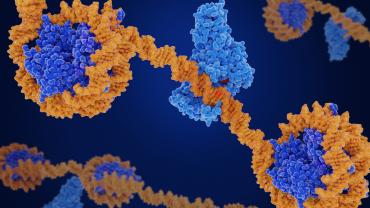
Methylation in the human body is a chemical reaction that transfers a one-carbon unit from one compound to another. Although that sounds relatively simple, methylation is critical for human functioning and influences gene expression, antioxidant status, and protein synthesis. Without proper methylation, human health can be disrupted.
One of the most common causes of dysregulated methylation is hereditary genetic polymorphisms (or variations) involving the methylenetetrahydrofolate reductase (MTHFR) enzyme. MTHFR regulates methylation and converts folate (vitamin B9) into its bioactive form. Folate is a vitamin essential for DNA synthesis, amino acid status, and normal cell growth and division. Genetic MTHFR polymorphisms may reduce the MTHFR enzyme activity.
Under normal circumstances, folate from food or supplements is converted into 5,10-methylenetetrahydrofolate (5,10-MTHF). Then, with the help of the MTHFR enzyme, 5,10-MTHF is converted into 5-methyltetrahydrofolate (5-MTHF), which is the main folate metabolite in the blood. This pathway is called the transmethylation pathway.
Healthy production of 5-MTHF allows homocysteine to properly convert into methionine, a critical amino acid for proper neurotransmitter, protein, and DNA status. In the presence of MTHFR polymorphism(s), homocysteine may only remain homocysteine in the body (and will not be converted into methionine). Elevated homocysteine is associated with cellular dysfunction and unhealthy inflammatory responses, and may also be associated with bone disorders, neurodegenerative diseases, and dysregulated blood sugar. Elevated homocysteine may also be a risk factor for cardiac dysfunction.
A common MTHFR polymorphism is C677T, and it is associated with a 50% reduction in MTHFR enzyme activity. Another common polymorphism is A1298C. Both C677T and A1298C polymorphisms are associated with elevated homocysteine.
Maintaining a healthy 5-MTHF status in the presence of MTHFR polymorphism(s) may be difficult. After all, the conversion of folate to 5-MTHF may be reduced. Supplementing directly with methylated folate as 5-MTHF may bypass this difficulty and promote healthy bioactive folate status in those with MTHFR polymorphisms.
A systematic review found that participants administered 5-MTHF supplementation had effectively increased their folate status compared to those administered folic acid (a synthetic form of folate). Researchers in vitro administered folic acid supplementation to cells with low MTHFR enzyme activity. Within these cells, there was no increase in 5-MTHF status. On the contrary, cells with low MTHFR enzyme activity supplemented directly with 5-MTHF resulted in a 10-fold increase in intracellular levels of 5-MTHF.
These results suggest that 5-MTHF supplementation may be clinically beneficial to individuals with identified or unknown MTHFR polymorphism(s). Furthermore, certain medications may also reduce MTHFR enzyme activity.
Proper folate status is vital in supporting normal homocysteine metabolism. However, methylated folate (as 5-MTHF) may further promote normal homocysteine metabolism in certain individuals. It is important to acknowledge that other B vitamins, such as vitamins B2, B6, and B12, also support healthy homocysteine metabolism and should be consumed in tandem with folate.
By Danielle Moyer, MS, CNS, LDN